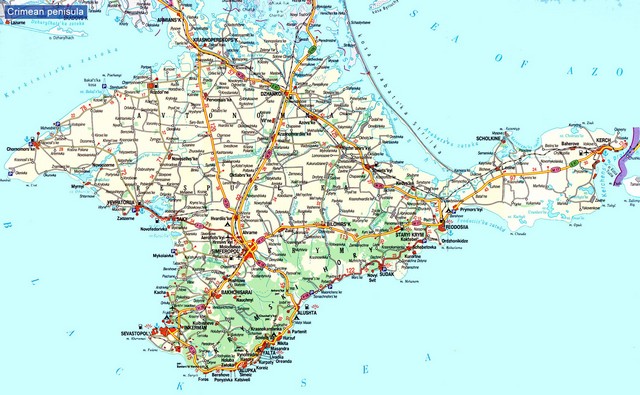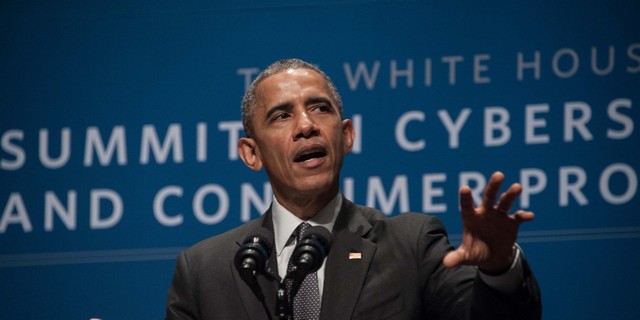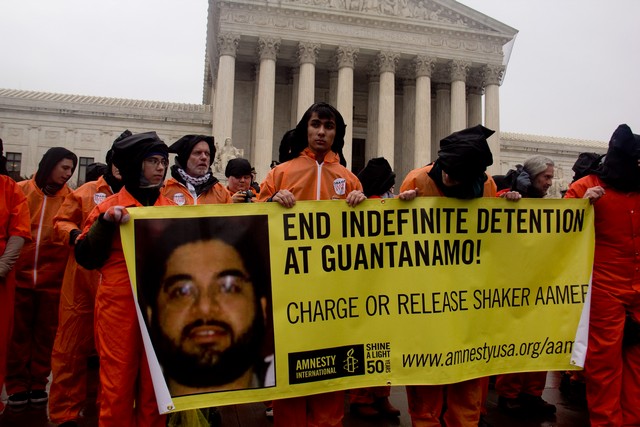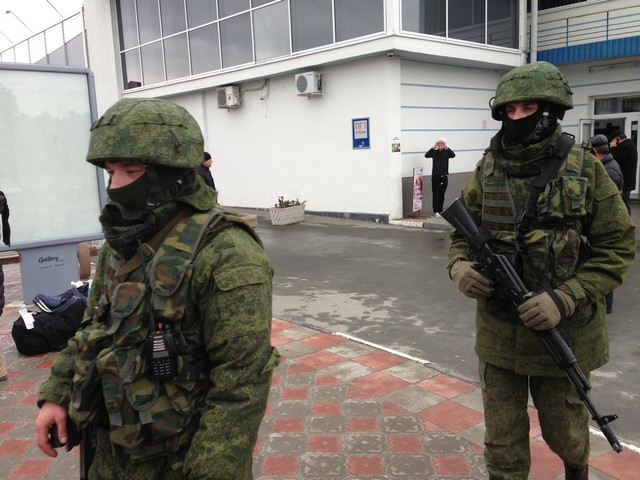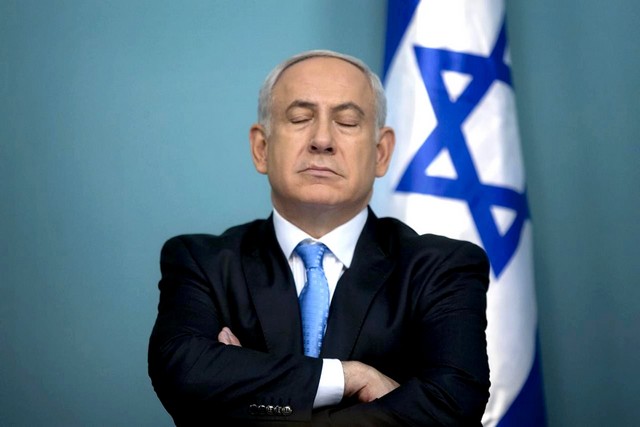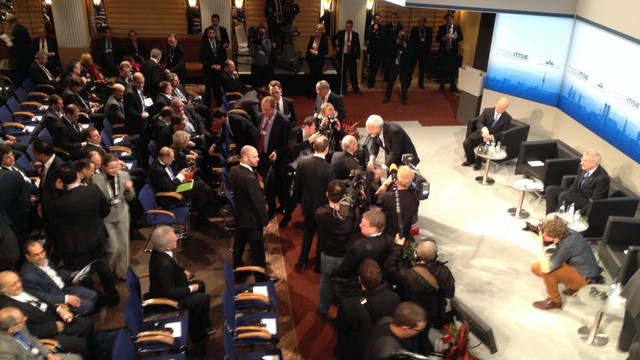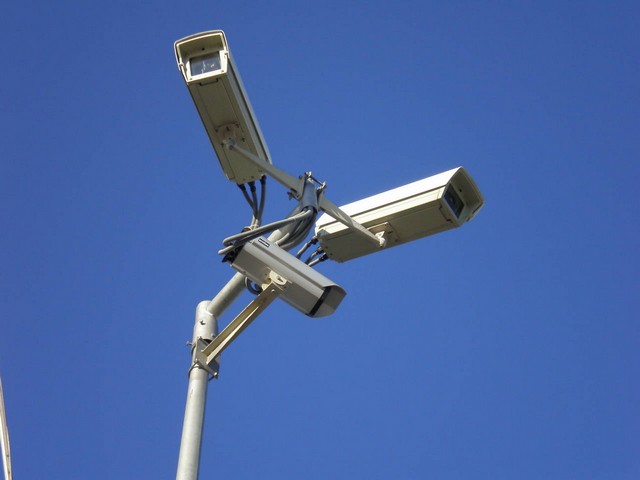By Eric Zuesse
.Both before and after Crimea left Ukraine and joined Russia in a public referendum on 16 March 2014, the Gallup Organization polled Crimeans on behalf of the U.S. Government, and found them to be extremely pro-Russian and anti-American, and also anti-Ukrainian. (Neither poll was subsequently publicized, because the results of each were the opposite of what the sponsor had wished.) Both polls were done on behalf of the U.S. Government, in order to find Crimeans’ attitudes toward the United States and toward Russia, and also toward Ukraine, not only before but also after the planned U.S. coup in Ukraine, which occurred in February 2014 but was actually kicked off on 20 November 2013, the day before Ukraine’s democratically elected President Viktor Yanukovych publicly announced that Ukraine had received a better economic offer from Russia’s Eurasian Economic Community than from America’s European Union. (The EEC subsequently became the Eurasian Economic Union, now that it was clear that Ukraine was going with the EU.) That decision by Yanukovych in favor of the EEC was mistakenly thought by him to be merely an economic one, and he didn’t know the extent to which the U.S. Government had set up an operation to overthrow him if he didn’t go along with the EU’s offer. (If some of these basic historical facts don’t come through from merely the wikipedia articles alone, that’s because the CIA is among the organizations that edit wikipedia articles, and so wikipedia is unwittingly a political propaganda vehicle. It is especially used for propaganda by the CIA and FBI.)
More recently, a poll of Crimeans was issued on 4 February 2015, by the polling organization GfK, and paid for this time by the pro-American-Government Canadian Government, via its Canada Fund for Local Initiatives, and via Free Crimea, which is itself funded by the latter organization. However, the Canadian Government got no better news than the U.S. Government had gotten: 82% of Crimeans “Fully endorse” Crimea’s having become part of Russia (of which it had been part between 1783 and 1954, and which the public there had never wanted to leave); 11% “Mostly endorse” it; 2% “Mostly disapprove”; 3% “Don’t know”; and only 2% “Fully disapprove.” Or, to put it simply: 93% approve; 3% don’t know, and 4% disapprove. This poll was publicly issued only in the polling organization’s own report, which was made available only in Russian (the Ukrainian Government’s main language for international business) and therefore not comprehensible to English-speakers. It was titled, “?????????-???????????? ?????????? ??????? ????? ???????????? ??????????? GfK Ukraine ?? ?????? ????????” or “SOCIO-POLITICAL SENTIMENTS IN CRIMEA: Research conducted by GfK Ukraine on the order of the company.” On February 10th, an English-language article reported and summarized the poll’s findings.
During the 16 March 2014 public referendum in Crimea, 96% voted to rejoin Russia. One question on the post-referendum, April 2014, U.S.-sponsored Gallup poll in Crimea, was headlined, “Perceived Legitimacy of March 16 Crimean Referendum” (on page 28 of the poll-report), and 82.8% of Crimeans agreed with the statement, “The results of the referendum on Crimea’s status likely reflect the views of most people here.” 6.7% disagreed. According to the newer poll (4 February 2015), 96% were for annexation to Russia, and 4% were opposed, which happens to be exactly what the 16 March 2014 referendum had actually found to be the case. But, continuing now with the description of the April 2014 Gallup poll: its “Views of Foreign Parties’ Role in the Crisis — Crimea” (p. 25), showed 76.2% of Crimeans saying that the role of the U.S. was “Mostly negative,” and 2.8% saying the U.S. role was “Mostly positive”; while Crimeans’ attitudes towards Russia were the exact opposite: 71.3% said Russia’s role was “Mostly positive,” and 4.0% said it was “Mostly negative.”
An accurate reflection of the reason why Crimeans, during the lead-up to the referendum, were appalled by America’s extremely violent and bloody takeover of the Ukrainian Government (as the EU itself had confirmed), was given on Crimean television shortly before the referendum, when a former criminal prosecutor in the Ukrainian Government, who lived and worked in Kiev and saw with her own eyes much of the violence but was not personally involved in the events, quit her office, and got in her car and drove back to her childhood home in Crimea, now unemployed, because she was so revulsed at what had happened to her country. On this call-in show, which was watched by many Ukrainians, she explained why she could no longer, as a lawyer and a supporter of the Ukrainian Constitution, support the Ukrainain Government — that it was now an illegal Government. She closed her opening statement, just before taking the calls from people over the phone, by saying, “Despite that our ‘great politicians’ who seized power by bloodshed, are now claiming that we don’t have the right to decide our own future — citizens of Crimea, you have every right in the world. Nobody is allowed to ururp power.” She subsequently became a criminal prosecutor in the new Crimean government, enforcing now the Russian Constitution, in Crimea.
However, anyone who says that Russia “seized Crimea,” is clearly lying or else is fooled by people who are.
Here, then, are highlights from a typical Western ‘news’ report about Russia’s President, Vladimir Putin, in the issue of TIME magazine (December 10th online, December 22nd issue on newsstands), headlining “Vladimir Putin, The Imperialist,” in which Putin was a “runner-up” as the “Person of the Year” — a year when, actually, Obama overthrew Ukraine’s Government and replaced it with one run by racist-fascist (or nazi) haters of Russia, who were setting up to yank the remaining years on Russia’s lease of its crucial Black Sea Naval Base in Crimea, and the Crimeans were imminently fearing a Ukrainian invasion (the author was Simon Shuster):
His decision in March to invade and then annex the region of Crimea from Ukraine marked the first growth of Russia’s dominions since the fall of the Soviet Union. …
With the conquest of Crimea, a derelict peninsula about the size of Massachusetts, Putin at last restored a scrap of Russia’s honor, says Gorbachev, by “acting on his own,” unbound by the constraints of U.S. supremacy and the table manners of international law. …
That name [Crimea], redolent with the history of Europe’s 19th century wars, has become a byword in Russia for national revival, a taste of the imperial glory that a generation of Russians have long hungered for. …
Already expelled from the G-8 club of wealthy nations in March after the annexation of Crimea, Putin was further ostracized at the G-20 summit. …
So, was Putin’s taste of empire worth the cost to Russian prosperity? For those who carry the grudges of Russian history, it was. …
Russia now seeks to position itself as an alternative to the Western model of liberal democracy—and it’s had some success. Right-wing politicians in France and the U.K., not to mention Central and Eastern Europe, are not shy about declaring their admiration for Putin. The ultraconservative government of Hungary, a member of NATO and the European Union, has announced its intention to develop as an “illiberal state” modeled on Russia, cracking down harshly on civil society. …
Putin will face challenges of his own as the West begins to rally against his aggressiveness. …
Make no mistake, though: Russians also remember that their country once dominated a sixth of the earth’s landmass and stood as a global player second to none. That is the role Putin seeks to regain. …
Nothing was said about the Black Sea fleet, nor about any strategic issue. Nothing was provided in order to help readers understand what was happening. Readers’ Cold-War buttons were being pushed; that is all. America’s aristocracy despises its public, whom they merely manipulate and control.
Here is an article about (and linking to) U.S. President Barack Obama’s “National Security Strategy 2015,” in which Obama uses the term “aggression” 18 times, 17 of them referring to Russia. Obama never once cites a reason for appying that term; for example, unlike Simon Shuster, he doesn’t even so much as mention “Crimea.”
And, here is the best video that has yet been issued on Obama’s February 2014 coup, the coup that installed the Ukrainian regime that has been carrying out the ethnic cleansing operation, which Ukraine calls their ‘Anti Terrorist Operation,’ in the Donbass region, though it’s really the anti-resident operation there.
That fate of ethnic cleansing or local genocide — the fate which befell the residents of Ukraine’s Donbass region, the region that’s shown in dark purple in this election-map for the man whom Obama overthrew in February 2014 and which is the area that voted 90% for him — is the fate that Crimeans were protected from when they rejoined Russia.
Russia’s using its troops, who were permanently stationed in Crimea already and didn’t need to ‘invade’ anything in order to protect the residents in Crimea so that they could hold their referendum in peace, is what blocked the seizure of Crimea by the newly installed Ukrainian regime.
The invader was the United States, in its typically sneaky post-1950 way: a coup d’etat. What Dwight Eisenhower’s, Allen Dulles’s, and Kermit Roosevelt’s CIA operation had done to Iran in 1953, Barack Obama’s and Victoria Nuland’s operation did to Ukraine in 2014: a violent coup installing a far-right government — in Obama’s case, even a nazi government (and see this and this and this).
That — and the firebombings and other horrors that Washington’s Brookings Institution think tank want U.S. taxpayers to finance yet more of in Donbass — is what Russia protected Crimeans from.
The aggressor here is not Vladimir Putin; it is Barack Obama. All honest news media (such as here and here and here and here and here and here and here) are reporting that. For economic analysis and reporting on these and other events, here is an excellent general news source. (It autotranslates if viewed in google’s chrome browser.) As for dishonest ‘news’ media, such as TIME and Fox ‘News,’ they serve a different purpose than truth; so, none of them will be listed here, where the only interest is truth.
PS: For further insights into the lying that is prevalent in the West regarding Crimea, Ukraine, and Russia, see this remarkably honest testimimony to the U.K. House of Lords’ 20 February 2015 Committee report, “The EU and Russia: before and beyond the crisis in Ukraine,” linked there on p. 108 as “RUS0012” and titled “Irina Kirillova MBE – Written evidence,” in which that Cambridge university professor describes the profound disappointment of ordinary people she had encountered in Russia, as they saw the misrepresentations in the West regarding the situations in Russia, Ukraine and Crimea. Outside of the English-speaking world, and especially in the regions that are not controlled by the U.S., the fakery of ‘journalism’ in the English-speaking world is becoming shockingly more evident than it formerly was. As usual, however, the House of Lords’ final report ignored these realities; and, throughout, it starts with the assumption that Russia is aggressive and that the West is merely responding to that. This professor’s written testimony was thus ignored. Most of the other individuals in the “Appendix 2: List of Witnesses” were the Anglo-aristocracy’s usual Russia-haters, such as Ian Bond, Director of Foreign Policy, Center for European Reform, saying that, “The most important thing is that the EU, as a rules-based organisation, should follow a rules-based approach to Russia,” as if that would be something alien to Russians. This type of bigoted condescenscion was rife throughout the report. If those people are as blind to evidence and science as they put themselves forth as being, they are dangerous in any governmental role; and to call the U.K. a ‘democracy’ is questionable, at best. Britain is an aristocracy, not a democracy. And the U.S. is at least as bad. In regards to the relationships between Russia, Ukraine, and Crimea, the West might be as bad as Ukraine, and should just quit the entire matter and try to start over from scratch, which means to let the nazis whom Obama placed into power there sink, not provide them with more weapons. Or, if more weapons are provided to them, then the rest of the West should issue sanctions against any nation that does that. Under liars and fools the West is drifting towards a totally unwarranted nuclear conflict with Russia.
—————
Investigative historian Eric Zuesse is the author, most recently, of They’re Not Even Close: The Democratic vs. Republican Economic Records, 1910-2010, and of CHRIST’S VENTRILOQUISTS: The Event that Created Christianity.
21 February, 2015
Countercurrents.org

